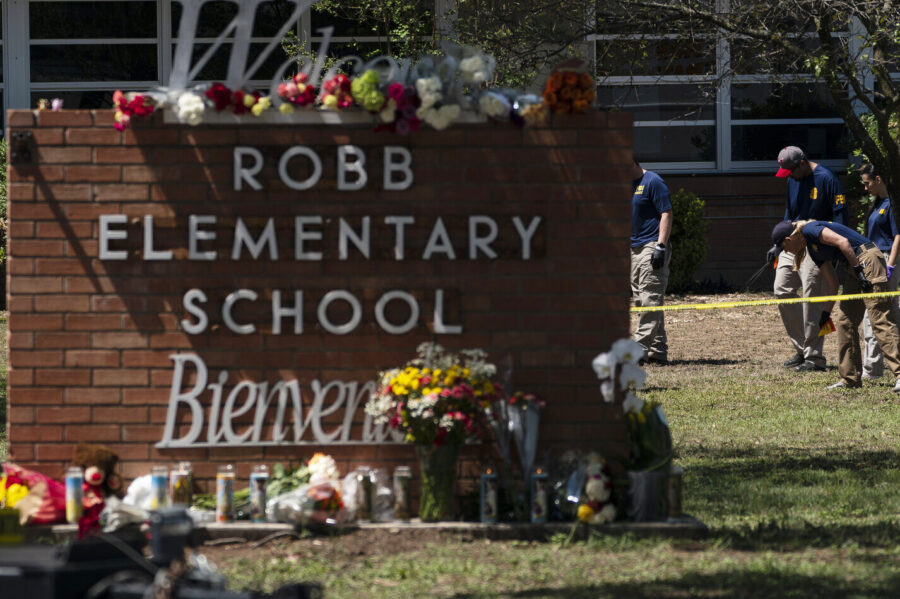Texas School Shooting: How to Help Kids Get Through Unspeakable Horror
With the nation reeling from the latest school shooting in Uvalde, Texas – one that left 19 elementary school children and two teachers dead – parents once again face two problems: how to process their own fear or grief? And how to talk to their children when tragedy strikes, especially when it feels so very close to home?
Understandably, after such an event, parents may feel weary or angry about the toll school shootings have had on our nation, as over 311,000 children have been exposed to gun violence in school since the tragedy at Columbine High School in 1999. Parents may be fearful about sending their children to school, and children may be afraid to go. An LA Times article lays out advice from child mental health experts on how to talk to your children in order to help them process fear and grief in a healthy way:
Open the conversation
Rather than waiting for kids to come to you, let your child or teen know you are available to talk. Always start by asking children what they have already heard about the event. Ask open-ended questions, answering in a calm, developmentally-appropriate way.
Katherine Williams, a child and adolescent psychologist and professor of psychiatry at UC San Diego, suggests asking your children how they are feeling by modeling your own feelings about the event: “I’m feeling worried for those families in Texas right now. How are you feeling?”
Give kids a sense of control
Richard Weissbourd, a Harvard psychology professor whose work focuses on vulnerability and resilience in childhood, stresses how important it is to give children and adolescents a sense of agency to counter helplessness or cynicism. Encourage teens who feel strongly about issues such as gun control or school safety to get involved in advocacy. Noting that it is individuals speaking up who have always sparked societal change, he notes, “Anything that will help them feel like they might have an impact on this problem, that it will be less likely to happen again if there is collective action, is really important.”
Younger children can write letters to the teachers, officers, and medical helpers on the scene, which “helps the child feel like they have hope, as well as some control in what feels like a scary world right now,” Williams suggests. “They can also make cards with words of support to the other children at Robb Elementary School, which can help them to process their own feelings.”
Reassure children that they are safe
Experts emphasize that parents also can and should tell their children that school is a safe place for them.
Keep the conversation age-appropriate
In an article in Today titled “How to talk to children about shootings: an age-by-age guide,” parenting expert Dr. Deborah Gilboa recommends not broaching the subject with very young children unless they are in danger of hearing about it elsewhere. “If it doesn’t directly affect your family, kids under 8 do not need to hear about this,” she explained. If a conversation is needed, for young children in preschool or kindergarten, keep it short and simple. You might offer a one-sentence explanation, such as “a bad person hurt people” or “a person with a serious illness felt angry and hurt people.” You might also focus on all the people who rushed to help.
Limit media exposure
In every age group, from young children to teens, “violent images can cause secondary trauma.” As Carol Vidal, a child and adolescent psychiatrist at Johns Hopkins University, told The Times in 2019, “every time [young children] watch the news, they feel like it’s a new event as opposed to repetition of the same event. It’s important for them not to watch too much.”
Model healthy behavior
Children pick up on how adults are feeling and what they are doing. Find support and process your own grief elsewhere. Limit your own media exposure. Exercise or talk to friends.
Dr. Khadijah Booth-Watkins, a psychiatrist and associate director of the Clay Center for Youth Healthy Minds at Massachusetts General Hospital, said it is critical for parents to manage their emotions before speaking with their children because “physical soothing” is as important as the words we choose.
“They feed off of us. They cue off of us and so if we’re not in control, we are going to be unable to help them manage their anxieties and help them gain a sense of calm and safety,” Booth-Watkins said.
Maintain routines
Routines and schedules offer a sense of security and normalcy. Having dinner together, doing homework, and letting teens hang out with friends are all helpful.
Make a plan
Review safety procedures – letting children know whom to call and where to meet – if there’s an emergency. This helps children feel secure, that adults are in control.
Monitor your children’s emotional state and get professional help if needed
Most children are resilient and a singular event will not impact them long term. But experts encourage parents to “watch for changes in behavior, mood, appetite or sleep” as well as acting-out behaviors such as tantrums. If these symptoms persist and interfere with functioning, seek professional help.
You can find more resources on how to speak with children about frightening events here:
- Parent Guidelines for Helping Youth After the Recent Shooting (The National Child Traumatic Stress Network)
- Helping Children Cope with Frightening News (Child Mind Institute)
- Coping in the Aftermath of a Shooting (American Counseling Association)
- How to Support Your Child During Conflict and Crisis Situations (UNICEF)
You can read the full LA Times article here.
Newberry, Laura. “Texas school shooting: How to help kids get through unspeakable horror.” The Los Angeles Times, 25 May 2022, https://www.latimes.com/california/story/2022-05-24/texas-school-shooting-how-to-help-kids-get-through-unspeakable-horror.



